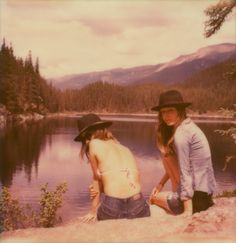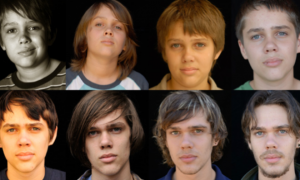Whenever I spend a weekend at a cottage it seems I get to know the other guests indirectly. Sharing space and geography with one another, the people on the dock slowly take form, becoming illuminated by unguarded and accidental moments rather than by the wining parry and thrust of cocktail conversation. Our encounters are plot less and without agenda, immersive, and slowly you just get a “feeling” for one another. It almost exists exterior to time, if that makes any sense, as we share a landscape that might be new to us, but is actually ancient, existing in geological rather than human time. There’s something humbling in that, and also something very honest in getting to know somebody when they’re outside of their lives rather than confined by them.
Boyhood, Richard Linklater’s most recent film, had this kind of “cottage effect” on me. Shot intermittently over 12 years, it depicts the unhurried, unremarkable metamorphosis of a boy as he ages from 6 to 18. Nothing really happens in the film, at least not as we’ve come to expect from the conventional, action-packed narratives that are part of our typical entertainment diet. Studiously avoiding exaggeration, Linklater employs a quiet, understated realism. Instead of getting to know the people on screen through defining acts of high drama, they’re revealed to us through ordinary, low-key repetitions. We get to know Mason, the boy in the film, before his personality is formed, and this makes for an unusually intimate and sympathetic portrait. We’ve been watching his pain and hope since he was a child, and like a parent, we cannot but help love him for that, even if we might not actually like him all the time.
Linklater repeatedly foreshadows catastrophe in Boyhood, and I kept waiting for something to happen, some tragic and intense vector to come sparking out of the story, but no, life plods along its ordinary trajectory. This, of course, is the way that it works in most of our lives, too. When we distractedly check our phones while driving, most of the time we don’t crash, and so it is in this movie, but each time that alarm signal is given, we remember just how fragile and beyond our control life is, and how at any moment, it can explode in tragic directions.
For me, a middle-aged man, the movie took place in the immediate, blurred past (last 12 years) where everything feels like it was yesterday, but simultaneously, the movie also took me to my distant past. Mason’s experiences, although set to a different backdrop of music, technology, etcetera, were my experiences growing up, too, and this gave the movie a circular, timeless feel. Getting to know Mason was like getting to know somebody at a cottage, proximal rather than directly communicated. All of our lives, for all the plot and ambition we stack upon it, unfold along the same lines. Nothing that happens to us is singularly unique, and in the end we’re all small, and there’s a beauty and melancholy in this shared humility, I think, something that Boyhood manages to bring out. And although the movie might not fully engage you throughout its three-hour journey, it will stay with you.




Comments
2 responses to “Boyhood”
Nicely done, sir. You have communicated, through the lens of your own experience, what will make the film appealing to a great many of us. I have always enjoyed Linklater’s work and I hope that your kind words spur others, like myself, to see ‘Boyhood’.
I think it’s the processes in life makes me who I am and helps me move forward. I realized this when visiting a childhood jumping rock that I last jumped from 50 years ago. I put my hand on the rock and said “Hello my friend. Thank you for still being here”. As I held my hand on the rock, feeling the texture and the heat from the sun, I recalled the many processes I had gone through over the years. It’s my common thread in all the processes that becomes my personality.
There is something magical about coming in contact with natural (outdoor) things that were touched in years past.